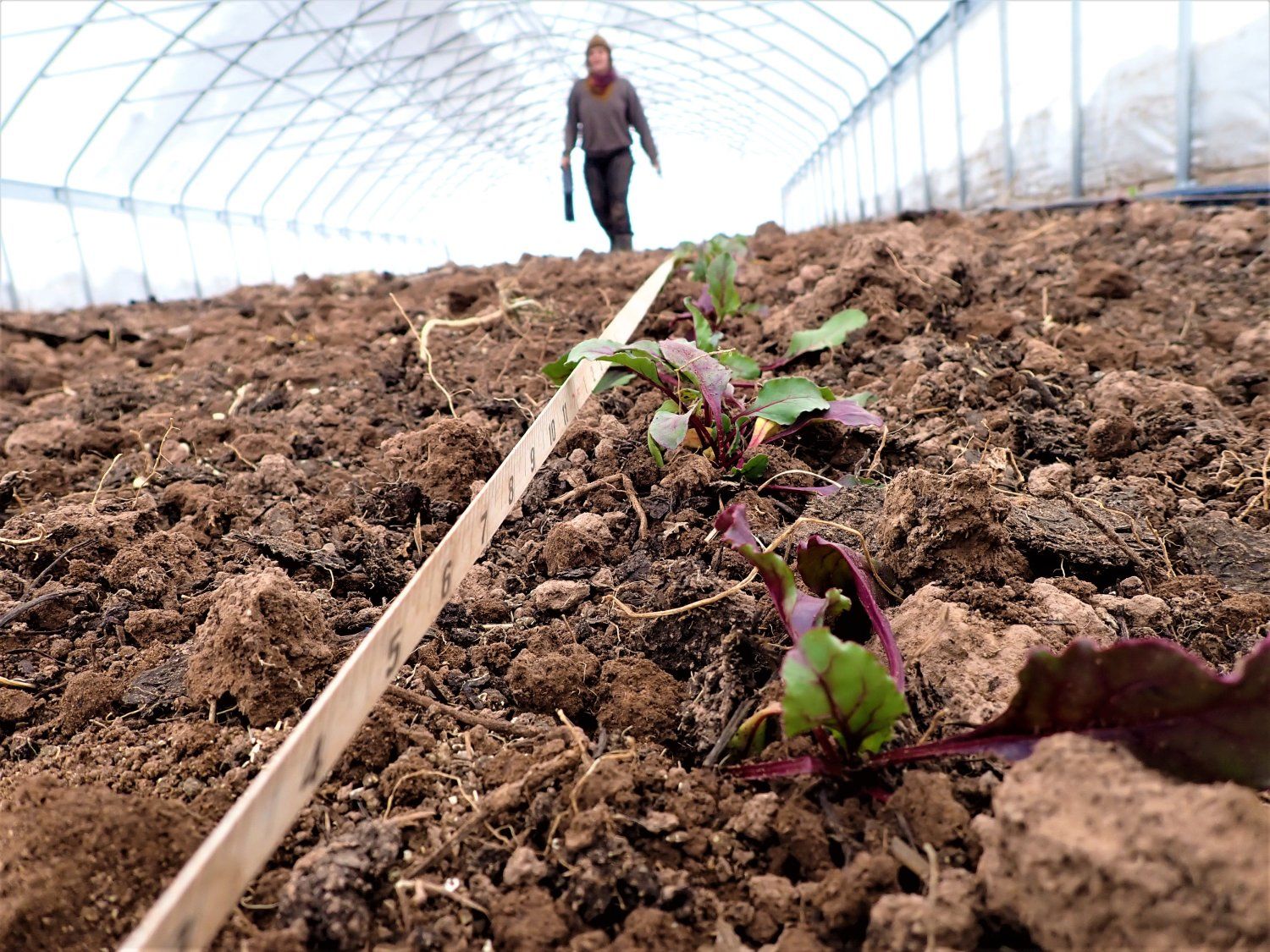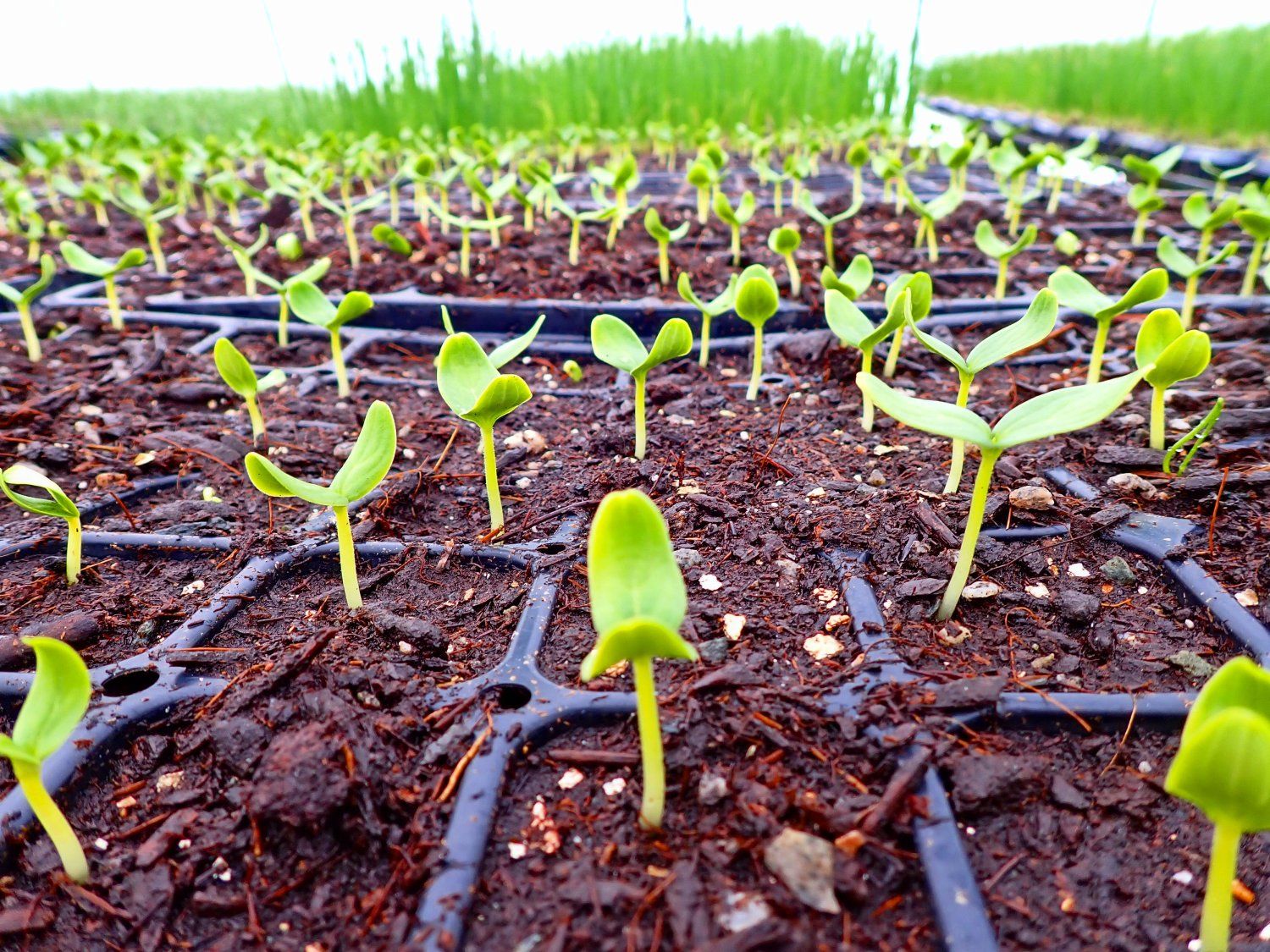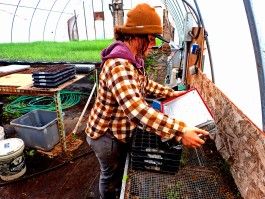Well, the weather is pretty lousy outside - is it muddy, or is it frozen? - but we're already well underway with the planting and growing season here at Great Oak Farm. This week, we seeded our first rounds of broccoli and cucumbers with our little vacuum seeder, as well as several beds worth of sugar snap peas. Mud season is here in full force, but we've got lots of great produce on the way!
The broccoli will be grown outside in the field, and is the first of NINE (!) rounds of broccoli we'll be starting this growing season. Seeding all of those flats of broccoli - over 2000 cells for this first succession - would be tough on the fingers. It doesn't take too long before your fingers start to cramp up after articulating all of those tiny seeds. Thankfully, our vacuum seeder (held by Farmer Ellen) does a great job of picking them up and seeding a whole flat at at time. Hard to believe that each of those tiny seeds will each produce a head of broccoli in about 90 days, isn't it?
The cucumbers and peas will be grown in our hoophouses with a little more protection from the cold and generally unsettled spring temps. Larger seeded crops like peas and cucumbers grow pretty fast, and will need to be transplanted into hoophouses in a week or two respectively, well before we have satisfactory conditions outside. Tiny seeds like broccoli on the other hand need to grow for about 4 weeks indoors until they are large and sturdy enough to be put outside on their own. However once outside, they can handle the cold much better than tender crops like cukes!
.jpg)
Meanwhile, we've been busy prepping beds and transplanting early crops into the hoophouses. The bed prep process happens all by hand in our hoophouses. Gently forking the soil, hoeing the top, and raking it smooth has had amazing results with improving our soil texture and structure. Back when we used the rototiller for this job, in just a few short years the soil in this hoophouse (the second hoop we constructed) was awful. No moisture holding capacity. Dusty. No earthworms at all. Packed hard down just below the surface. It was bad, friends, and our crops struggled in there.
Fast forward some years, and with a change in management techniques (bed prep by hand, not by machine) and a little compost, it's some of the nicest soil we have here on the farm. Those broadforks sink into the soil with very little effort, it's so loose and soft. Soil moisture is perfect - moist enough to work easily, but not soggy despite the wet conditions outside. Working with soil like this helps to remind me the power of regenerative, sustainable agriculture!
Collards, scallions, and the rest of the beets were transplanted into this tunnel (the center bed will be used for peas which will go in next week) and are growing nicely now. We've covered them with row cover to keep them a little warmer during this cold spell, so here's what that hoophouse looks like now:
.jpg)
The garlic got hoed this week and is looking fantastic. Barring any unforeseen circumstances (haha, none of those in farming... right?) we'll be harvesting fresh garlic at the end of June for your summer CSA boxes. Garlic is a pretty hardy crop, with few pest and disease pressures in our area, so I think July garlic is a pretty safe bet. Oh, and lets not forget those garlic scapes in June either. Great on the grill drenched in olive oil, and made into some fantastic pesto by our friends at Spirit Creek Farm.
.jpg)
One other task that we checked off this week was putting the starter back on our old 1947 Allis Chalmers G cultivating tractor. You may recall that last year it was having issues, so I took it in to a starter repair shop in Superior. When I got there, the owner chuckled and said, "What is this, some kind of antique!?" After looking around for a few weeks, he was unable to find replacement parts for it, and sadly the G remained parked for the rest of the season while we searched for an alternative solution. They don't make any new starters for those tractors, so we had to get ours repaired somewhere.
After some extensive searching, I found a shop that specialized in Allis G starters (right?!) in the lower Midwest. We shipped the starter there, and a few weeks later we got it back looking in near new condition. By then, the weather was way too cold to think about working with metal wrenches in hard to reach places, so we took advantage of a warm day earlier this week to get the new starter installed.
.jpg)
These electric components on an engine are such complicated little parts - springs, coils, very small tolerance gaps, little bits of copper here and brass there - that I swear they must be magic. Why else would they have to be shaped so strangely... I read the Harry Potter books. I know sorcery when I see it! ;) In all seriousness, I am so grateful for folks who still have the skills and equipment to maintain the antique tractors we use to grow all of this produce. Once the warmer weather is here to stay, we'll mount our basket weeder on this tractor for controlling weeds in our field crops this season.
.jpg)
Finally, this week we have been saying goodbye to the sweet litter of Australian Shepherd puppies we have been fostering for the Chequamagon Humane Association (CHA) for the last few weeks. As of this writing, there is still ONE puppy that has not been adopted yet... If you need a new puppy in your life, I'd highly recommend him - he's a sweetie! He loves cuddling (though he is a little shy at first), playing with other dogs, and isn't super "bitey" or loud like lots of puppies are. He really enjoys being outdoors, and runs around outside with a huge smile on his face! Talk to the CHA if you are interested, but act fast - unadopted puppies usually get scooped up fast.
That's it for this week. Thanks for making us YOUR farmers!
In community,
Farmer Chris
Great Oak Farm

.JPG)



